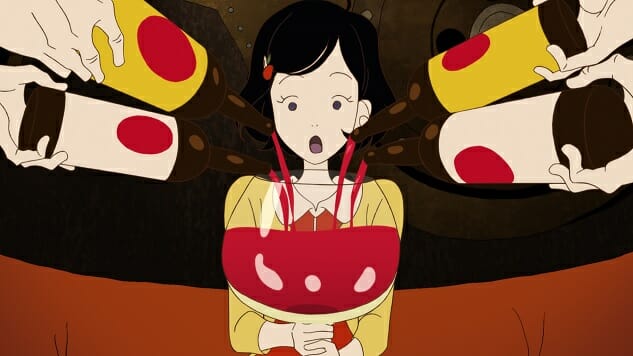The Night Is Short, Walk On Girl

Life looks better animated. Amazing how a tradition as old as cel production can strip reality’s imperfections away and leave behind a world sumptuously rendered. Everything is more inviting when hand-drawn: A kotatsu laden with steaming dishes of nabe, drinking contests that end in paralytic intoxication, magical book fairs held at twilight, young romance, and even student musical theater tempt the senses when filtered through animation. Your mouth waters like a broken dam. Your curiosity inflames. You heart sings in exhilaration.
Masaaki Yuasa’s The Night Is Short, Walk On Girl feels purpose-built to elicit that kind of response, perhaps more so than most anime: The film marries the appealing exaggerations of its style with the heightened atmosphere of romantic comedy, layering screwball antics with anime’s vibrant liveliness. It’s a fitting combination, often loony, always lovely, and damn near hallucinatory, a delightful mosaic of nighttime misadventure. Everyone has made an occasional bad decision in the wee hours. The Night Is Short, Walk On Girl feels like a paean to those decisions, a memorial to mischievous, carefree youth going out on the town and staying out until the town wakes up. Like those nights, the film is dizzying. Keeping up takes an iron party-going will. But the stories you get to tell forever after are well worth the hangover.
The Night Is Short, Walk On Girl refers to the lead character, credited as “The Girl With Black Hair,”(Kana Hanazawa), a plucky lower classman at university who embarks on a wild and blotto caper across Kyoto with friends and associates because that’s what you do when you’re on campus and in need of an excuse to be anywhere else. Embarking on her drunken spree, she’s pursued by an older male student, Senpai, or “Senior” (Gen Hoshino), madly in love with her and incapable of telling her so. He contrives random meet-cutes with her in accordance with his grand romantic plan, Operation AHO, or “Appear Before Her Often”: Yuasa introduces us to Senpai through a montage of such moments, the girl proclaiming their encounters coincidence, Senpai correcting her by calling them chance.
Lodged somewhere between “painfully shy” and “total creeper,” the poor lovestruck bastard is not the film’s focus. He’s a reactive rather than proactive character, ever on the trail of the girl’s dust as she gallivants about Kyoto, followed by a train of merrymakers each in relative states of drunken stupor. She has the constitution of an ox that itself has the constitution of a god: She drinks, and drinks, and drinks, gulping down colossal draughts of varying liquors, her throat bulging to bullfrog proportions with each swig, yet she doesn’t falter or wobble. Her speech doesn’t slur. Her spirit doesn’t flag. She’s headstrong and intrepid, which comes in handy as evening progresses and she makes many new, weird acquaintances.